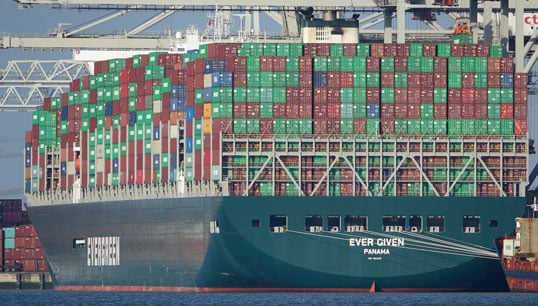- Topics
- Campaigning
- Careers
- Colleges
- Community
- Education and training
- Environment
- Equality
- Federation
- General secretary message
- Government
- Health and safety
- History
- Industrial
- International
- Law
- Members at work
- Nautilus news
- Nautilus partnerships
- Netherlands
- Open days
- Opinion
- Organising
- Podcasts from Nautilus
- Sponsored content
- Switzerland
- Technology
- Ukraine
- United Kingdom
- Welfare

The salvage industry continues to face economic pressures with the demise of key industry names. The International Salvage Union Annual Review 2020 provides an insight into the pressing issues facing the salvage industry, including concerns over training, equipment and the environment, amid high-profile incidents in the international media. Saffiyah Khalique reports
The 2020 International Salvage Union (ISU) Annual Review analyses how the salvage industry has been affected during the year of the coronavirus pandemic.
The industry continues to face economic pressure as industry heavyweight Ardent, which formed in 2015 through a merger with Maersk Group's Svitzer Salvage and Crowley Group's Titan Salvage, ceased signing future salvage contracts, leaving just three major players in the global salvage business – Resolve Marine, SMIT and T&T Salvage. There are growing concerns over whether the industry will have the capacity to deliver the kinds of professional services that shipowners, insurers and governments rely on globally.
One of the most notable statistics of the review is the significantly weaker revenues compared with 2019. Gross revenue for ISU members was reported at US$301 million resulting in a 38% drop from 2019.
The industry has also suffered a significant fall in wreck removal and services with 182 services in 2020 provided compared with 216 in 2019. This has resulted in a 68% drop in wreck removal income.
The structural change in the last 18 months and the loss of Ardent may have influenced these statistics.
The salvage industry also faced the challenge of additional costs brought on by the onset of the pandemic. The ISU emphasises that these extra costs brought on by restrictions, quarantines, aircraft charters and enhanced decontamination are legitimate costs – ones which the insurers should pay.
Wreck removal
Wreck removal is central to the work of a marine salvor and has become increasingly more important over the years, accounting for around 50% of ISU members' income.
Successful intervention by marine salvors means that majority of marine casualties are salvage cases and the vessels are towed to safety or refloated or repaired and returned to service.
However, this is not possible in all cases due to the financial costs of salvaging, which can be uneconomical, as well as the physical dangers to the crew.
The ISU emphasises that there is strong need for the importance of professional and experienced marine salvors, however, there needs to be investment into the equipment used, into training and development of staff, so that there will continue to be professional salvage services.
Environmental Concerns
Alongside the annual review, the ISU conducts an environmental review to identify the quantity of potentially polluting cargo and fuel that was involved in its members' operations.
The 2020 survey found that ISU members provided 191 services to vessels carrying 2.5 million tonnes of potential pollutants. That is a small increase from 2019's total of 2.3 million tonnes. The ISU states that not all of these potential pollutants were at risk of going into the sea with some cases having limited danger, but many others will have carried a real risk of substantial environmental damage.
Containership fires have become an increasing concern for shipowners, insurers and salvors, and the sinking of the X-Press Pearl has brought this to public's attention in the international media.
In the second quarter edition of the ISU newsletter, the environmental concerns are expressed through a member's involvement in the salvage attempt of the X-Ppress Pearl. The containership, which caught fire and sank off Colombo in early June, made international headlines for the environmental impact the sinking would have.
Smit Salvage was contracted by the shipowner to provide immediate assistance with additional firefighting capacity. However, due to poor weather and sea conditions the efforts were halted, and the entire vessel was engulfed in flames sinking soon after. The efforts to minimise pollution emanating from the vessel are continuing.
The incident also raised questions around places of refuge, as it was reported that the vessel had been denied permission to unload at Middle Eastern ports after containers were leaking chemicals.
President of the ISU Richard Janssen restated the importance of the salvage industry: 'Professional salvors protect the environment, reduce risk and mitigate loss. They also keep trade moving – demonstrated so clearly in front of the world's media with the refloating of the containership Even Given in the Suez Canal this year. But there also has to be a concern about the ongoing provision of salvage services globally and the long-term viability of the industry as it is today. ISU continues to actively engage with shipowner and insurers to ensure we are aligned with them on the future challenges they are likely to face.'
Tags
